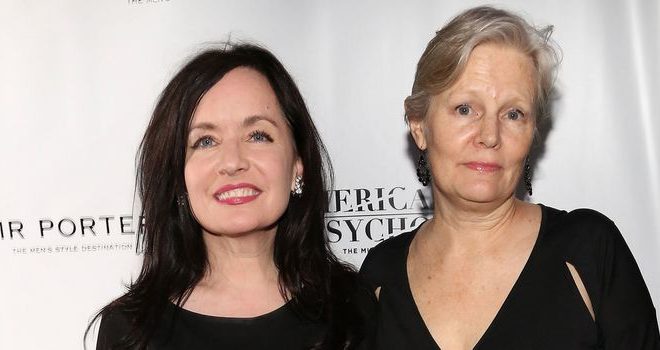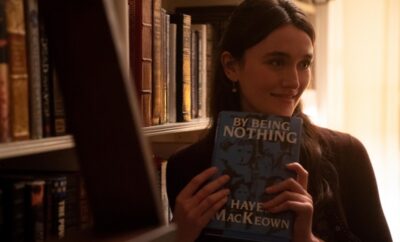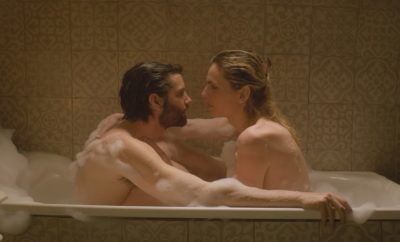 Patrick McMullan
Patrick McMullan
Interviews
Guinevere Turner – Charlie Says
By: Ashlee Dell’Arciprete
Q) First off, congratulations on the film and its New York premiere at Tribeca. What inspired you to you write Charlie Says?
A) Thank you! The producers met with me to write a film about “the Manson girls” because of my work on American Psycho – I brought something else to the table: my childhood in a cult-like family and also that I had written The Notorious Bettie Page. I’d done bio-pic, I’d done serial killer, I had my own thing to bring: seemed like a natural fit.
Q) While it was very different from Manson’s, you spent part of your childhood in a cult yourself as part of the Lyman Family, which you wrote about in The New Yorker. How much of that helped you to write this film and did you draw from any of your experiences?
A) I did draw from my upbringing in small and subtle ways: a kind of texture, a sensibility. A real sense of daily life, of how good times can turn quickly into bad times, etc.
Q) How much research went into this film and how involved were you in decisions during the filmmaking process of the film?
A) So much research! Nearly everyone who’s touched this story and/or was around at the time of the crimes has written or spoken about it. There are books, documentaries, unreliable narrators, interviews from underground papers in the mid-70s, YouTube videos, SO much. And people to talk to. It was an epic journey to finding the story I wanted to tell.
The director, Mary Harron, and I are friends and this is our third film together, so I really had as much input as I wanted to have. I mean, with respect to the boundaries of her directing of course, I was talking to actors when they had a question I could answer more in depth or some of the choices in sets and props, etc. I was there every day, all day. It was great.
Q) Some of the scenes are really dark. Were any of the scenes difficult to write?
A) Yes, all of it was really difficult to write actually. It’s a really sad story. In actual fact the hardest scenes to write are not the dark or sad ones, it’s the ones where you have to get information across. I must have written the scenes between Karlene (Merritt Wever) and the warden of the prison 25 times! Not kidding. That’s true of most screenplays, I find.
Q) As a female screenwriter, what made you want to tell the story of The Charles Manson Family from the female perspective?
A) Well, the story has always really been told from Manson’s perspective, with the women being kind of interchangeable. I wanted to change that. In general, I think going back and revisiting a lot of stories that are in our cultural consciousness from the male perspective is valuable and interesting and eye-opening. I hope it keeps happening more and more and not just in my work.
Q) It took a while for Leslie, Patricia and Susan to realize the spell they had been under and recognize guilt. What was the decision process for that like?
A) The decision process for them was different for each of them and arguably not a decision but an inevitability once they were separated from Manson for a while and given other perspectives on the world. The decision process for me and how to represent it was to be as true to it as I could figure out how to be, which is to say largely from Karlene Faith’s book The Long Prison Journey of Leslie Van Houten, since Karlene Faith witnessed it firsthand.
Q) How do you think Matt Smith handled the role as Charles Manson?
A) I think he’s great in the role. He couldn’t be more physically less like Manson was, but he is a talented actor and found a way to get into a physicality that made us feel Manson, and a way of moving and speaking that I think really got the essence of Manson, both the charming guy and the totally scary guy.
Q) What was the creative process like for the way the murders of Sharon Tate and the other victims are written in the film?
A) I wrote the screenplay before Mary Harron came on board to direct and I had less of the violence in the film initially. After she came on board we got into a very interesting ethical discussion. I had shied away from representing the murders to avoid feeling exploitative and because we’ve seen all that and that’s not the story I was trying to tell. She pointed out that because the film comes off as so sympathetic to these women who were in fact murderers, no matter how much they were manipulated. It was important not to shy away from the reality of the violence. In the end we found a balance that I think feels respectful to both.
Q) The 50-year anniversary of the Sharon Tate murders is approaching. What do you think is the impact that has had on society?
A) I actually really don’t like that we landed here on the 50th anniversary of those horrible murders. We didn’t plan it that way (I started writing this film in 2014 and this is just how long it took to make it!) and it feels a bit tacky to me. Films just take a long time to make sometimes and this is where we landed. That said, the impact seems to be fading with a new generation of people. I’ve shown Charlie Says to several college audiences and they know very little about this story. (Well, until now. Here we go again!)
The impact it had on society in the late 60s was that the hippie happy days were over and things were about to get dark. People started to lock their doors and buy guns. The idea that the counterculture was leading to murdering strangers fed into everyone’s worst fears.
Q) You are also from Massachusetts where one of the infamous murderers was of Whitey Bulger. Do you have any plans to write films about other infamous murderers?
A) Oh hell no! It’s all romantic comedies from here. OK, that’s not entirely true – but I would like to steer away from true crime at this moment. There’s plenty of that to go around.
Q) You also wrote the screenplay for American Psycho, which you worked on with Mary Harron. What was it like teaming up to work together again as screenwriter and director respectively?
A) It was great! After decades of knowing each other and being good friends, watching her kids grow up, supporting each other through other projects that weren’t us together, we share such an easy collaborative language and trust that we actually have a great time digging in together. We think the same things are funny and the same things are important. It’s been that way since we met in 1995.
Q) What are some of the other upcoming project you’re working on?
A) Mary and I have a new project we’ve written about four homeless teens who are outcasts of the foster care system and I’m working on a few other things that I don’t want to jinx until they are actual things! Of course, much, much more to come. Just getting started, really.





You must be logged in to post a comment Login